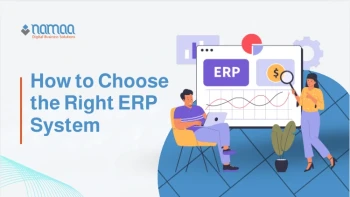Enterprise Resource Planning (ERP) Systems: Enhancing Business Efficiency
Organizations constantly seek ways to optimize efficiency and streamline their internal operations to achieve higher productivity. Enterprise Resource Planning (ERP) systems play a key role in integrating processes and data across various departments, including accounting, human resources, manufacturing, and supply chain management, into a unified system. This seamless integration improves data accuracy, speeds up decision-making, and reduces operational costs through automation and error minimization. Ultimately, ERP systems boost productivity and enhance customer service.
The Importance of ERP Systems in Business Performance
ERP systems provide real-time visibility into financial and operational activities, enabling managers to make informed, data-driven decisions. Additionally, ERP systems enhance collaboration across different departments by ensuring that employees have easy access to relevant information, improving coordination and increasing productivity.
These systems also contribute to better resource management, whether financial or human, by offering accurate reports and predictive analytics that support strategic planning. Furthermore, ERP systems improve customer satisfaction by optimizing supply chain management and ensuring efficient order fulfillment.
How Do ERP Systems Work?
ERP systems function by collecting, processing, and distributing data across various departments through a centralized database. This integration streamlines communication between business functions, improving operational efficiency.
Whenever new data is entered, such as a purchase order or employee record, it is automatically updated across all relevant modules, ensuring that all departments access the same real-time information. Additionally, ERP systems automate key processes like invoicing, inventory tracking, and production scheduling, reducing manual intervention and errors.
Modern ERP solutions leverage artificial intelligence (AI) and predictive analytics to help businesses analyze trends and make proactive decisions. They can also integrate with e-commerce platforms and CRM systems, enhancing overall functionality. Organizations can choose between on-premises or cloud-based ERP systems, with cloud solutions offering greater flexibility and remote accessibility, making them a preferred choice for companies embracing digital transformation.
Key Components of ERP Systems
ERP systems consist of several core modules that work together to improve business processes:
✔ Human Resource Management (HRM): Manages employee records, recruitment, training, and payroll processing to enhance workforce performance.
✔ Financial Management: Covers accounting, accounts payable & receivable, and financial reporting for better financial decision-making.
✔ Supply Chain Management: Optimizes procurement, inventory control, and logistics to reduce costs and improve efficiency.
✔ Customer Relationship Management (CRM): Enhances customer engagement, sales tracking, and support services, increasing customer loyalty.
✔ Project Management: Helps in resource planning, progress tracking, and budget management to ensure projects are completed on time and within budget.
Who Uses ERP Systems?
ERP systems are widely adopted across various industries to streamline processes and enhance efficiency:
✔ Manufacturing: Used for production planning, inventory control, and supply chain management to improve product quality and cost efficiency.
✔ Service Industries (IT & Consulting): Helps in project management, workforce tracking, and performance evaluation to optimize service delivery.
✔ Education Sector: Universities and institutions use ERP for student enrollment, academic management, and HR operations to enhance student experience.
✔ Small and Medium Businesses (SMBs): ERP systems help unify operations, improve efficiency, and support future growth.
These examples highlight the versatility of ERP systems and their significance in improving business processes and operational efficiency.
Types of ERP Systems
ERP systems vary based on business needs and deployment models. The main types include:
1️⃣ On-Premises ERP: Installed on internal company servers, offering complete data control and security. Best for organizations that require full autonomy over their infrastructure.
2️⃣ Cloud ERP: Hosted on third-party cloud providers, offering remote access, scalability, and automatic updates with lower infrastructure costs.
3️⃣ Hybrid ERP: A mix of on-premises and cloud-based solutions, balancing data control and operational flexibility.
4️⃣ Open-Source ERP: Provides customization capabilities, making it ideal for SMBs looking for a cost-effective, scalable solution.
5️⃣ Industry-Specific ERP: Designed for specific sectors like manufacturing, healthcare, or finance, offering tailored features to meet industry standards.
Choosing the right ERP system depends on company size, operational requirements, and budget.
Pros & Cons of ERP Systems
✅ Benefits of ERP Systems:
✔ Process & Data Integration: ERP centralizes business data, ensuring smooth information flow and minimizing duplication.
✔ Operational Efficiency: Automates manual tasks, enhances visibility, and improves productivity.
✔ Data Accuracy & Decision Support: Provides a single source of truth, enabling informed decision-making.
❌ Challenges of ERP Implementation:
✔ High Costs: ERP implementation can be expensive, including licensing, setup, and training expenses, making it a challenge for smaller firms.
✔ Complex Deployment: Organizations often face challenges adapting to ERP due to system complexity and change resistance.
✔ Employee Resistance: Some employees may struggle to adopt new ERP-driven workflows, affecting adoption rates.
While ERP systems offer game-changing benefits, companies must carefully plan implementation and employee training to maximize success.
Key ERP Market Statistics & Impact on Business Performance
? Growing ERP Market: The ERP market is expected to reach $65.25 billion in 2024 and $103.95 billion by 2029, with a 9.76% annual growth rate.
? Increased Efficiency: Businesses using ERP report a 22% rise in operational efficiency and a 20% reduction in operational costs.
? Improved Customer Satisfaction: 85% of companies using ERP systems see better customer service & retention.
? Strong ROI: 75% of businesses achieve a positive return on investment (ROI) within three years of ERP implementation.
? Better Planning & Forecasting: 70% of organizations report improved strategic planning and decision-making.
? Optimized Inventory Management: 65% of ERP adopters have reduced inventory costs and waste.
? Regulatory Compliance: 60% of organizations using ERP systems experience better compliance with industry regulations.
? Improved Cross-Department Collaboration: 80% of companies observe enhanced interdepartmental coordination after ERP adoption.
? Industry Adoption: ERP systems are extensively used across manufacturing, services, education, and SMB sectors for process optimization & competitiveness.
? Overall Performance Boost: 95% of ERP users experience noticeable improvements in business productivity & efficiency.
 Home
Let's think together
Articles
About
Contact Us
عربي
عربي
Home
Let's think together
Articles
About
Contact Us
عربي
عربي

.webp)




